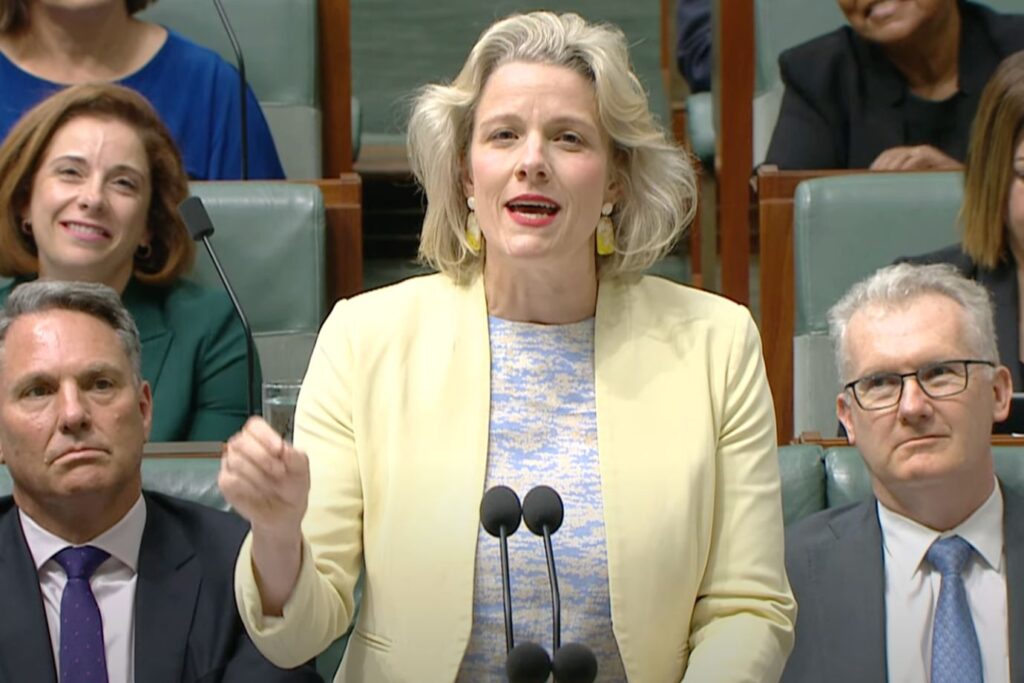Labor’s housing legislation has passed in the Senate after the Greens announced it would back the Bill it has opposed for months.
The legislation, which includes Labor’s Help to Buy shared equity scheme and the Build to Rent tax incentives, could help 40,000 first home buyers purchase a property.
The Help to Buy scheme involves the government contributing 30 per cent of the price of a home – and 40 per cent for a new build – for first home owners earning an income of under $90,000 for single applicants, or $120,000 for a couple. The government’s contribution must be repaid upon sale of the property.
Earlier this year, the Greens did not support Labor’s Bill and instead pushed for concessions on negative gearing and tax breaks.
As of November, the Greens scaled back their negotiations and instead proposed Labor to commit to building 25,000 more social and affordable homes.
Housing Minister Clare O’Neil did not accept these negotiations, and as of Monday morning, the Greens conceded and instead pledged their support for Labor’s proposals.
Greens spokesperson for housing Max Chandler-Mather told reporters on Monday that the minor party did everything they could to push Labor on its housing policy.
“The Greens can announce that we’ll be waving through Labor’s two housing bills after accepting that Labor doesn’t care enough about renters to do anything meaningful for them,” Chandler-Mather said.
“If we come to the next election and there’s still a housing crisis – well, that’s a question Labor has to answer.
“Because we know the solutions to the housing crisis: it’s capping rent increases; it’s phasing out negative gearing and capital gains tax discounts; it’s starting getting the government in the business of building genuinely affordable housing, the way it used to.”
Minister O’Neil announced the successful Bill in Question Time on Tuesday – shortly after it passed in the Upper House – and criticised the Opposition’s lack of support.
“I’ve had a little bit of constructive criticism to offer the Greens in recent days, Speaker, but let’s all agree, Speaker, that at least the Greens are showing a modicum of interest in housing policy in this country,” Minister O’Neil said.
Earlier on Tuesday, Max Chandler-Mather joined shadow minister for housing Michael Sukkar at the National Press Club to debate housing, prior to the Bill passing in the Senate. Michael Sukkar criticised Labor’s legislation during the debate.
“They’re terrible policies which is why we are in many respects, we’re unsurprised but dismayed that the Greens are now supporting it,” Sukkar said.
“On Build to Rent – the Greens have sold out … They’ll vote with Labor to give preferential tax treatment to foreign corporates to own housing stock in this country for build to rent developments.”
As Sukkar continued to link the issue of migration with the housing crisis, Max Chandler-Mather condemned the shadow minister for doing so.
“Why is it every time there’s a crisis, that the rich and powerful in the major parties – backed by their big corporate donors – facilitate a debate in a race to the bottom in going after migrants?” Chandler-Mather said.
“The Greens will not participate in that. We just won’t. The real solution to this is taking on those big corporations who are getting away with paying no tax, taking on those property investors and phasing out those tax handouts and getting back to a more fair and equitable system.”
Australia’s housing crisis disproportionately affects women, and much of this goes back to Australia’s gender pay gap. According to CoreLogic’s Quarterly Rental Review (latest release October 2023), men paying rent in Sydney spend 37 per cent of their income on rent, whilst women spend 42 per cent.
Another way we can see the housing crisis play out in real time, hitting women the hardest, is the rate of homelessness in Australia. And women are the fastest growing cohort of people experiencing homelessness in Australia.
In the 2021 Census, 44.2 per cent of the 122,494 people estimated to be experiencing homelessness were women. This was a 10.1 per cent increase from the 2016 Census, according to the Australian Bureau of Statistics: women accounted for 81.7 per cent of the 6,067 increase of people experiencing homelessness in 2021.


